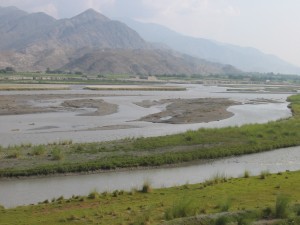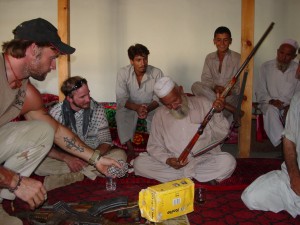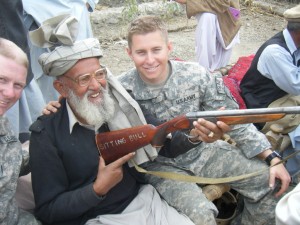Gifts of Honor: A Tale of Two Captains


Mangwel and the Konar River Valley
[Friends, with apologies, a stomach virus has laid the blog low. Here’s a re-run of a post that has been a reader favorite. We’ll be back on Wednesday!]
June 22nd, the Washington Post ran an excellent article by Greg Jaffe, titled “A Personal Touch in Taliban Fight.” The piece is about a young Army captain, Michael Harrison, and his up-close-and-personal work as a company commander in the remote tribal villages of the Konar River valley in Afghanistan.
Flashback to 2003, same valley, same U.S. Army—different captain. This is the story of then-captain Jim Gant of Las Cruces, NM, and how he and Capt. Harrison are linked by a gift of honor, a 12-gauge shotgun.
A tribal chief
Mangwel is a village in Konar province, close to the border with Pakistan’s North West Frontier Province. Terrain is mountainous, no paved roads; Taliban fighters use the valley regularly as an infiltration route to and from Pakistan. The chief in Mangwel is Malik Noorafzhal. He’s 86 now; he fought the Soviets in the 80s; he’s been defending his tribe’s turf all his life.
In 2003, Special Forces Operational Detachment Alpha 316–twelve men, led by Capt. Gant–had Mangwel as part of its area of responsibility. The ODA helped the chief in some tribal warfare, fighting alongside him. The chief said he would return the favor to augment the ODA’s mission; he mentioned that he could deliver 8 men with guns, then upped it to 80. On 23 April 2003, Capt. Gant had a meeting with him and other tribal leaders. The following is from the captain’s OPSUM [Operation Summary], written immediately afterward:
The head local we have named “Sitting Bull.” He is an old, old warrior. He didn’t speak much. I didn’t speak much either. I mainly listened. I looked him in the eye often. After the meeting was adjourned, he asked to speak with me privately. So my terp [interpreter] and I went out back with him. He took my hand in his. “I want you to know, Commander Jim, that you have my loyalty. If you need men with guns you come see me.” He promised 800. From 8 to 80 to 800!
Bonding tribe-to-tribe
Capt. Gant made it a point to bond with Sitting Bull. This nickname that the ODA gave the chief captures the spirit of their affection and admiration. These tough Special Forces soldiers regarded the malik as a living figure of legend, a warrior who had fought and defeated many enemies, a leader to whom the highest respect was due. They loved to question him about his battles with the Russians and he loved to tell them his stories. The warriors, American and Afghan, would stay up deep into the night, drawing maps of ambushes and infiltrations. Capt. Gant had his own father, James Karl Gant, send Malik Noorafzhal a knife with “Sitting Bull” engraved on it—and a letter, man-to-man, father-to-father. Here is part of it:
My son says you are a great warrior. He respects you and considers you to be his friend. He tells me that your enemies are his enemies. He says he would give his life to protect you. Be my son’s father while he is in your country. Take this gift from us as a token of our friendship.
Through his interpreter, Captain Gant read the letter to the chief.
When I read [the letter] to Sitting Bull, he was outwardly moved by it and said, “Tell your father not a hair on your head will be harmed as long as you are with me, you are now my son.”

Sitting Bull, the shotgun and Capt. Gant, 2003
A gift of honor
Capt. Gant and the ODA wanted to give the chief their own gift of honor. They searched and found a beautiful 12-gauge shotgun. The photo on the right shows the moment they presented it. That’s Capt. Gant beside the chief. Up front is SFC Mark Read.
Flash forward to 2009, a few weeks ago. Marine Col. Bing West, author of The Strongest Tribe, about Marines in Iraq, is now in Afghanistan researching a book. He visits Mangwel and meets with Malik Noorafzhal. The first thing the chief does is to bring out, proudly, the gift shotgun and ask Col. West if he can get him some shells, as he is all out. The photo below tells everything. Bing West e-mailed it to now-Major Gant, who forwarded it to me. The young officer next to Sitting Bull is Capt. Michael Harrison—the company commander profiled by the Washington Post–who is now on his second tour in Konar. Here is part of an e-mail Capt. Harrison sent from there to Major Gant, 18 June 2009, a few days ago.
Over the past five months, he [Malik Noorafzhal] has helped us out tremendously. His son and son-in-law both work at our COP [Combat Outpost] as ASG [Afghan Security Guards.]

Sitting Bull, the shotgun and Capt. Harrison, 2009
Tribesmen relate man-to-man
Men of the tribes never forget an insult or a kindness. Six years later, Capt. Gant and ODA 316’s heartfelt gift of honor is paying dividends for follow-on generations of American soldiers. And Capt. Harrison (though he and Maj. Gant have never met) is employing the same tribal language of man-to-man, person-to-person bonding. From Greg Jaffe’s article in the Washington Post:
Between his two tours, Harrison, whose boyish face and blond hair make him look like an especially earnest grad student, had kept in touch with his interpreter and several of the Afghan leaders from his old sector via e-mail. He sent them packages of T-shirts, jeans and toiletries. Soon after he arrived in Konar for the second tour, Harrison bought mosque speakers for the religious leaders in his area. Although his current sector is a three-hour drive from his old base, Afghans whom Harrison hasn’t seen since 2007 sometimes arrive at the gates of his new base. Many show the guards scraps of paper bearing Harrison’s signature, proof that they once knew him. “You cannot come to me, so I am here to visit with you, my good friend,” one man told Harrison.
All this is not to say that life is roses today in Konar province. Successes are unfortunately the exception, and tribal-savvy breakthroughs like those produced by Capt. Gant and Capt. Harrison are, so far at least, only the model for achievements to come.
Tribes and Alexander the Great
When Alexander fought in the Afghan kingdoms 2300 years ago, a gift of honor might be a horse or a Damascene sword. Alexander understood that such tokens, presented man-to-man, warrior-to-warrior, were the currency of tribal alliance. The celebrated tale of Alexander marrying the Afghan princess Roxane is usually told as a romance–the youthful king smitten by the ravishing damsel. There may be an element of truth to this, but Alexander was also a shrewd political animal whose army was then mired in a disastrous three-year counter-insurgency campaign with no end in sight. He married his way out of that quagmire, by taking to wife the daughter of his most powerful foe, the warlord Oxyartes, thus making his enemy into his father-in-law.
That marriage was an act of honor. In tribalspeak it said to Oxyartes and the other warlords, “I honor you as an equal, you have fought me to a draw and won my respect; let us make war no longer but join our two peoples in a peace whose issue will be prosperity and happiness for all.”
A shotgun and a bride, a gift and an act of honor. Perhaps the Obama era’s young officers and men, incoming now to Afghanistan, can take a page from Alexander and Oxyartes, from captains Gant and Harrison, and from a chief called Sitting Bull.



